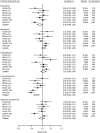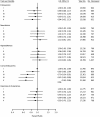Personality and all-cause mortality: individual-participant meta-analysis of 3,947 deaths in 76,150 adults
- PMID: 23911610
- PMCID: PMC3755650
- DOI: 10.1093/aje/kwt170
Personality and all-cause mortality: individual-participant meta-analysis of 3,947 deaths in 76,150 adults
Abstract
Personality may influence the risk of death, but the evidence remains inconsistent. We examined associations between personality traits of the five-factor model (extraversion, neuroticism, agreeableness, conscientiousness, and openness to experience) and the risk of death from all causes through individual-participant meta-analysis of 76,150 participants from 7 cohorts (the British Household Panel Survey, 2006-2009; the German Socio-Economic Panel Study, 2005-2010; the Household, Income and Labour Dynamics in Australia Survey, 2006-2010; the US Health and Retirement Study, 2006-2010; the Midlife in the United States Study, 1995-2004; and the Wisconsin Longitudinal Study's graduate and sibling samples, 1993-2009). During 444,770 person-years at risk, 3,947 participants (54.4% women) died (mean age at baseline = 50.9 years; mean follow-up = 5.9 years). Only low conscientiousness-reflecting low persistence, poor self-control, and lack of long-term planning-was associated with elevated mortality risk when taking into account age, sex, ethnicity/nationality, and all 5 personality traits. Individuals in the lowest tertile of conscientiousness had a 1.4 times higher risk of death (hazard ratio = 1.37, 95% confidence interval: 1.18, 1.58) compared with individuals in the top 2 tertiles. This association remained after further adjustment for health behaviors, marital status, and education. In conclusion, of the higher-order personality traits measured by the five-factor model, only conscientiousness appears to be related to mortality risk across populations.
Keywords: meta-analysis; mortality; personality; psychology; survival analysis.
Figures


Comment in
-
Invited commentary: Personality phenotype and mortality--new avenues in genetic, social, and clinical epidemiology.Am J Epidemiol. 2013 Sep 1;178(5):676-8. doi: 10.1093/aje/kwt169. Epub 2013 Aug 1. Am J Epidemiol. 2013. PMID: 23911611 Free PMC article.
-
Re: "Personality and all-cause mortality: individual-participant meta-analysis of 3,947 deaths in 76,150 adults".Am J Epidemiol. 2014 Mar 15;179(6):791-2. doi: 10.1093/aje/kwt300. Epub 2014 Feb 5. Am J Epidemiol. 2014. PMID: 24503946 No abstract available.
-
Dr. Chapman replies.Am J Epidemiol. 2014 Mar 15;179(6):793-4. doi: 10.1093/aje/kwt301. Epub 2014 Feb 5. Am J Epidemiol. 2014. PMID: 24503947 No abstract available.
-
The authors reply.Am J Epidemiol. 2014 Mar 15;179(6):792-3. doi: 10.1093/aje/kwu009. Am J Epidemiol. 2014. PMID: 24738124 Free PMC article. No abstract available.
References
-
- Smith TW, MacKenzie J. Personality and risk of physical illness. Annu Rev Clin Psychol. 2006;2:435–467. - PubMed
-
- Bogg T, Roberts BW. Conscientiousness and health-related behaviors: a meta-analysis of the leading behavioral contributors to mortality. Psychol Bull. 2004;130(6):887–919. - PubMed
-
- Kotov R, Gamez W, Schmidt F, et al. Linking “Big” personality traits to anxiety, depressive, and substance use disorders: a meta-analysis. Psychol Bull. 2010;136(5):768–821. - PubMed
-
- Friedman HS, Tucker JS, Schwartz JE, et al. Psychosocial and behavioral predictors of longevity: the aging and death of the ‘Termites. Am Psychol. 1995;50(2):69–78. - PubMed
Publication types
MeSH terms
Grants and funding
LinkOut - more resources
Full Text Sources
Other Literature Sources
Medical

